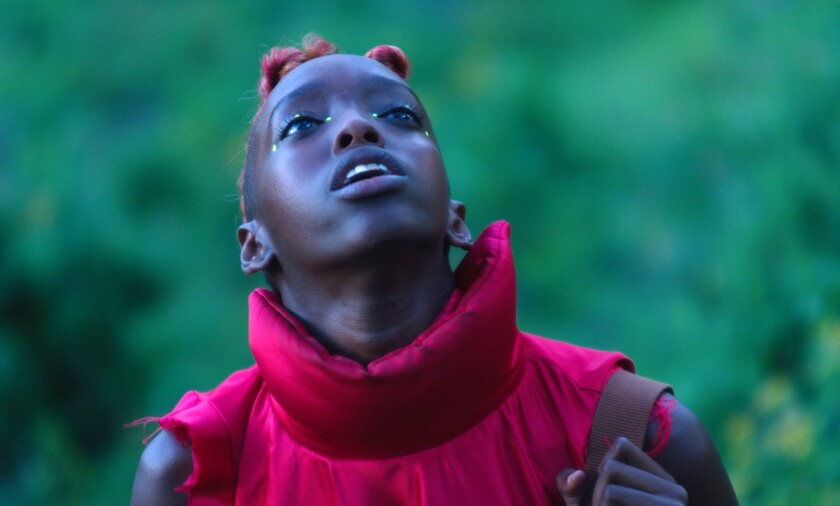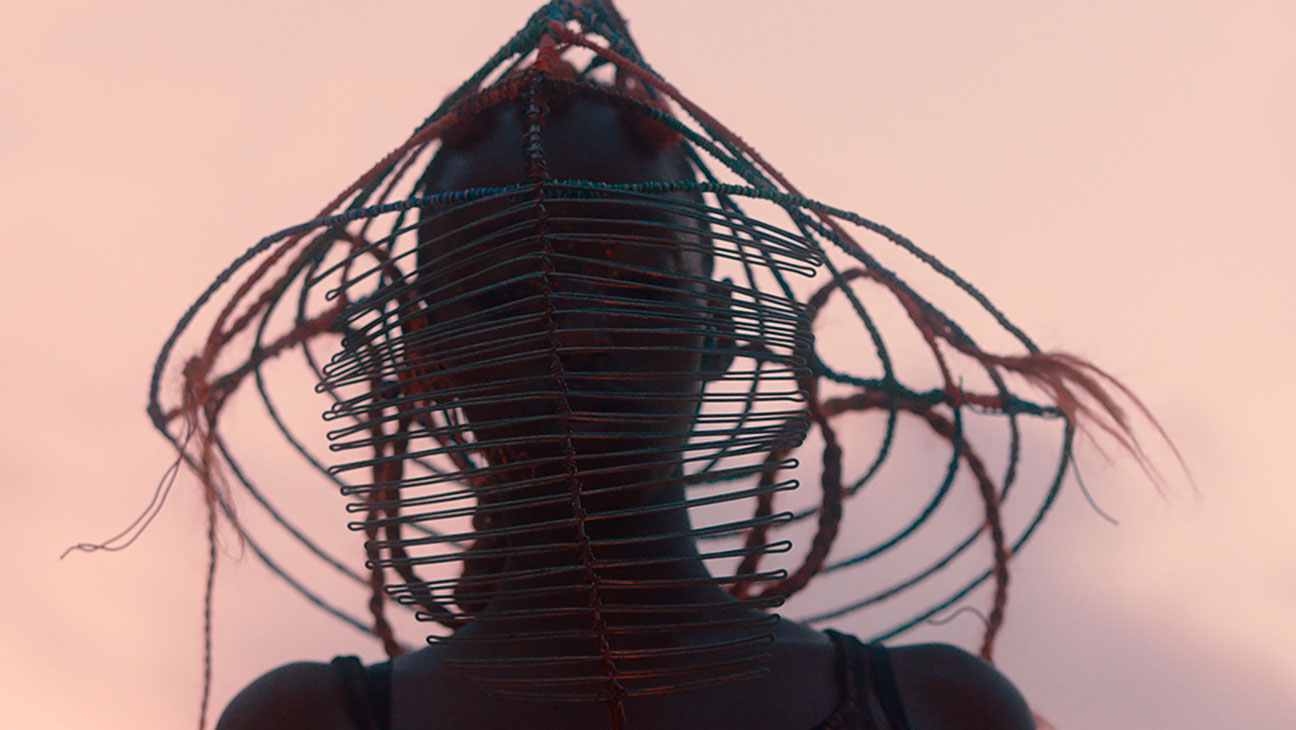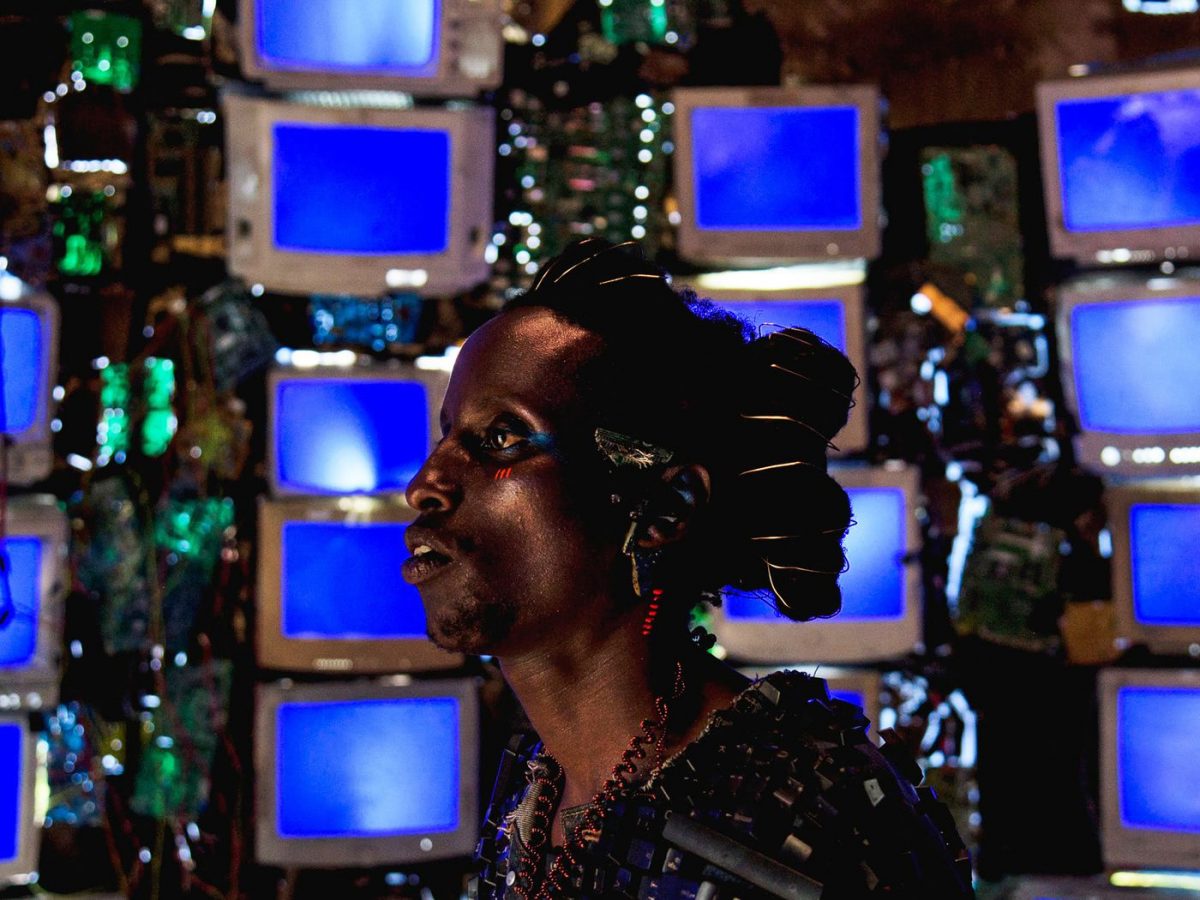Neptune Frost is the only movie I watched twice during virtual Sundance last January.
Saul Williams and Anisia Uzeyman’s afro-futurist musical is bursting with energy and life. Filmed in Rwanda, it features an amazing cast of artists, many of whom are war refugees, and some of the most striking costumes and production design you’ll see anywhere.
Even though they were working with a vanishingly small budget, Uzeyman and Williams stage spectacular musical numbers filmed on location deep in the forest and in a working mine. The resourcefulness of the production is equaled by the sophistication of the ideas embedded in the afro beat soundtrack.
“The concept came first and once Anisa and I had the concept, the first thing I wanted to use towards world-building was the music,” says Williams.
Neptune Frost is a fantasy of revolution arising from the coltan mines of Africa. The mineral is used extensively in computers and consumer electronics, but the people condemned to extract it see none of the material wealth and comfort their labor enables. Near the mine is a vast landfill of e-waste, where scavengers search through mountains of discarded keyboards and monitors for a few grams of valuable metals. In between, a group of rebels carve out Digita, a would-be utopia led by a supernatural hacker named Neptune (Cheryl Isheja).

“This film was born when Anisia and I discovered the phenomenon of e-waste camps, which are situated around the continent, usually very close to the mines where the materials that go into our technology are taken,” says Williams. “And so, around the same time, we discover that there’s these village sites and camps with mounds of motherboards and keyboards and towers and all these things.
“We were also tuning into a lot of the recycled art that was coming out of these situations — not just art, but science. We were learning about people in Togo, for example, who were taking e-waste and making 3D printers out of it. We learned about people in Sierra Leone who were taking e-waste and making robotic prosthetic limbs out of.
“So, there was a lot of stuff on our timeline that was very inspiring, that that made us envision this idea of a village made of recycled computer parts. The production designer and costume designer that we worked with is a Rwandan artist by the name of Cedric Mizero. When he heard the story, he was very shy. He listened, and then the next morning he showed up at our place in Rwanda with sandals made of motherboards. We were very clear on the fact that we had found the right person.”
During the month-long production, Uzeyman and Williams filmed in extreme circumstances far from the nearest town, sometimes while coordinating crews of more than 100 people.
“It was really intense,” says Uzeyman. “We traveled the country, which is said to be the land of a thousand hills.”
Williams says they were lucky to connect with an established group of artists in the Rwandan capital.
“The political unrest in Burundi in 2015 sent a lot of students, artists, and activists, over the border, into Kigali,” Williams said. “And so, that scene there is really reflective of amazing talent from Burundi and Rwanda; that’s what the film really reflects. All of the members of our cast are established musicians, poets, actors, choreographers, dancers, and drummers and they were already in the mode of performance. What carried us was their excitement about participating in this story.”
“It’s like a portrait of a generation,” says Uzeyman.

At every turn in Neptune Frost, there is a sense of an old world dying, and a new one struggling to be born.
“It really reflect the fluidity of the youth in Rwanda, where we shot the film,” says Uzeyman. “On the continent, people speak like five languages correctly, regularly. And it’s something that we found very new and very beautiful to show because it’s not especially portrayed a lot — that fluidity that the migrations and all those movements inside of the continent produce.”
Williams says the free intermixing of language became a kind of metaphor for the new world of unlimited information.
“As an American sitting at a table, listening to a conversation, and realizing that people are choosing which expression from which language works best, it became super important for us platform that in the film,” Williams says.
Amidst all the beats and costumes and dancing, Williams says “we’re connecting dots between how the brain works and functions and the coding patterns of language, and what it means to break those codes. Those guys do it fluidly.”
Indie Memphis, in association with Tone, the Black Creator’s Forum, and Dedza, is sponsoring a free screening of Neptune Frost at Crosstown Arts on Wednesday, June 15th. It is a truly unique cinema experience that has been blowing minds all around the world.
“We are very happy with all that people see in the work,” says Williams. “We are very proud to have connected so strongly with the LGBTQ community, with indigenous community, and with the tech community. And we see that the people who now have a chance to see it…that it’s resonating with them.
“We’re just excited about people being able to explore this world and this universe. We obviously built something with a lot of space for questions, with a lot of space for the imagination. We wanted to invite the viewer in to, to participate in our creative process.”
